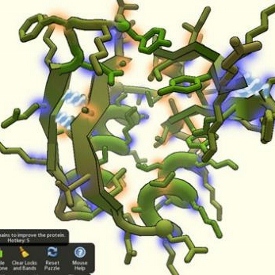 Have you ever heard of an online computer game called Foldit? I hadn’t until today when I saw this article at PCMag.com about how some gamers took about three weeks to solve a puzzle that had befuddled HIV/AIDS researchers for years.
Have you ever heard of an online computer game called Foldit? I hadn’t until today when I saw this article at PCMag.com about how some gamers took about three weeks to solve a puzzle that had befuddled HIV/AIDS researchers for years.
According to the PCMag.com article, gamers used Foldit “to predict the structure of a protein called retroviral protease, an enzyme that plays a critical role in the way HIV multiplies. Unlocking the build of the protein could theoretically aid scientists in developing drugs that would stop protease from spreading.”
Interestingly enough, few of the gamers involved in solving the problem had any background at all in molecular biology. For them, it was apuzzle, based a a specific set of rules.
According to a study on the project published by Nature Structural & Molecular Biology, although the idea of using gamers to solve scientific puzzles has been around for awhile, but “this is the first instance that we are aware of in which online gamers solved a longstanding scientific problem.” Authors of the study also say: “These results indicate the potential for integrating video games into the real-world scientific process: the ingenuity of game players is a formidable force that, if properly directed, can be used to solve a wide range of scientific problems.”
Apparently, Foldit gamers have also helped come up with solutions to problems facing scientists fighting cancer and Alzheimers, too. And the folks at Foldit say there’s more to come, dealing with “one of the algorithmic discoveries in Foldit recipes, and a brand new synthetic protein discovered primarily due to the insight of Foldit protein design.”
That kind of makes me feel a little better about the amount of time our kids spend playing games online! Of course, I am not sure how playing Minecraft is going to help cure AIDS or cancer or anything else. But maybe Minecraft is just the stepping-stone to Foldit. It’s also about creativity and spatial reasoning, after all.















